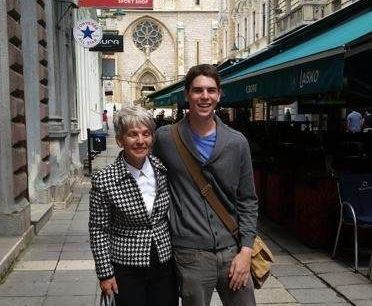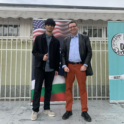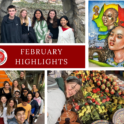StoriesBack to Stories
A Note on Trust

By Daniel Herschlag, YES Abroad 2014-2015, Bosnia and Herzegovina
In normal day-to-day life, building trust takes time. Let me assure you that from my exchange experience thus far, life abroad can at times appear to be far from typical. Everyone knows what a “trust fall” is; it has become one of those cliché team building exercises we have all done at least once, I imagine. However, on an exchange, before the “trust fall” you don’t get the luxury of being able to glance multiple times behind you to makes sure there is someone there. It’s more like being blindfolded, and instead of close friends behind you, it’s a random person. Instead of having the potential of falling onto a padded mat or some grass, it can be a “bed of nails.”
In almost every exchange setting, whether it’s your new school or in your new home, you have to trust people, FAST. One particular quote that I read about studying abroad holds very true: “It’s not a year in your life--it’s a life in a year." You can’t afford to take years to build up trust with people because you simply don’t have the time. You just need to let yourself “fall” and trust that someone will catch you, even though you don’t have any particular reason to believe that they will.
Someone asked me if studying abroad was like a leap of faith; I think the better description is little hops of faith. For example, sometimes when my host mom makes me a meal, I have no idea what it actually is. I just have to trust that it will be good. (A faith that has not been misplaced!) Or when I try to speak Bosnian, I trust my friends to not totally make fun of my (beyond) horrible accent and then to correct me so I don’t make the same mistake again. When I go on my trips to the selo (countryside) with my host family, I am usually getting in the car with one of my host mom’s relatives. I trust that they will be able to navigate the winding roads of Bosnia. You just have to constantly make these little “hops of faith” in the day. I think that if I didn’t take these little “hops of faith,” my exchange would not be one tenth of the rich experience that it has been thus far.
I like to be able to trust people. In fact, trusting people, even if I don’t have much reason to do so, is a personal rule I follow in life. One early fear about my exchange experience was that sticking to this rule would be difficult. Back in the States, almost every activity and hobby I did required some level of trust. When I whitewater kayak, I trust that if I ever got into a tricky spot, my friends would be there to help me. When I am sparring in martial arts, I trust that my sparring partner is not going to purposely try to knock me out. When I dangle 50 feet in the air as I rock climb, I trust that the person belaying me won’t let me fall if I lose my grip on the rock face.
Being able to trust someone is not hard for me. But trusting at home is different—the people in whom you place your trust usually have a shared background and many shared experiences. I have known most of my friends for years. Trust is a lot easier to do when you are in a familiar environment, and let me say, an exchange program in a foreign country does not put you in a familiar environment.
I’ve been in Sarajevo for more than two months now, and I can tell you, without a doubt, that I am still in the early stages of familiarity. One of the many reasons I wanted this exchange experience was to test my ideological convictions. I wanted to see if I would continue living by those convictions and I wanted to find out if they were just convictions when they were convenient and easy. I have learned two important things so far: one, my conviction of trust is not one of convenience. Two, regardless of our different backgrounds and experiences, people everywhere seem to want to trust and to be trusted. It is a universal element that ties us together.





